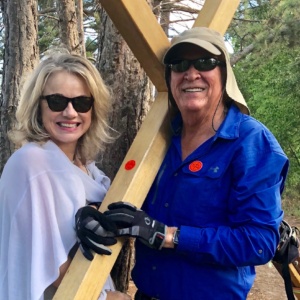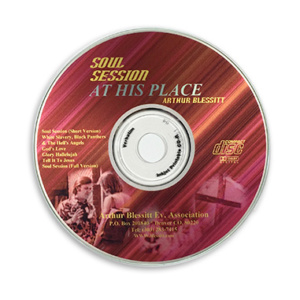Chapter 2
Passion From Above to Share
Jesus on Earth
Behold, I say to you, lift up your eyes and
look at the fields, for they are already white
for harvest!
—John 4:35
Before I started walking around the world with a cross, I led His Place, a Jesus nightclub coffeehouse on Sunset Strip in Hollywood, California.
One evening, a couple of men got into an argument at His Place and one of them—a three-hundred-pound fellow named Henry—hit the other man in the face. Hit him so hard, in fact, that an ambulance had to come and pick up the injured man.
I went up to Henry, put my arms around him, and said, “Henry, why did you hit that guy?” He stepped into my office. And do you know what happened next? This huge, broad-shouldered, tough guy fell over in my arms, crying. Through his tears he at last answered my question: “He was laughing at my girlfriend, who’s in jail.”
I learned something that day. However tough or otherwise immune some people might seem on the outside, on the inside they need God’s love just as much as anybody else. Henry was a three-hundred-pound baby with a hurting heart. And just like him, many people whom we might write off by saying, “Oh, they won’t respond to the message of Jesus,” are in fact ready to respond to the Lord if encouraged by us even a little.
We need to look at people, not with a worldly or selfish perspective, but with the eyes of Jesus. We need to speak to the heart of a person and not to his or her appearance.
From Compassion to Harvest
How did Jesus look upon people? With love and compassion for all. The Lord is “not willing that any should perish but that all should come to repentance” (2 Peter 3:9). He wants every lost person to come into the family of God.
Oh, how He yearns for the ones who are wasting their lives apart from His love! Looking over the holy city one day, Jesus said, “O Jerusalem, Jerusalem…how often I wanted to gather your children together, as a hen gathers her chicks under her wings!” (Matthew 23:37). As a shepherd searches for a lost sheep, as a woman searches for a lost coin, and as a father welcomes home a lost son (Luke 15), so Jesus has come “to seek and to save that which was lost” (19:10).
One Gospel passage says this of Jesus: “When He saw the multitudes, He was moved with compassion for them, because they were weary and scattered, like sheep having no shepherd.” What did Jesus do next? He turned to His disciples and said, “The harvest truly is plentiful, but the laborers are few. Therefore pray the Lord of the harvest to send out laborers into His harvest” (Matthew 9:36-38).
From compassion to harvest, that is Jesus’ pattern, and it should be ours as well. And so, how about us, do we have the same yearning as Jesus has for the lost? Do we look upon the lost with compassion, such that we can’t wait to share Jesus with them?
From compassion to harvest, that is Jesus’
pattern and it should be ours as well.
In my experience, too many believers are not sharing Jesus at all or are sharing far too little. Some of us may just need some encouragement or some teaching about how to share Jesus with others. This book can help with that. But for the most part, it really is a heart problem: we need to be filled with the compassion and love of Jesus so that we love the lost as Jesus does.
I don’t know the condition of your heart, and I wouldn’t presume to judge you. But I do recommend that you ask God to search your heart and reveal to you what needs to be changed. Then ask Jesus to change you by the power of the Holy Spirit. Jesus will give you the desire to share Him with others.
The Desire to Share Jesus
God gives the desire to share Christ enthusiastically. That desire comes from the heart of God. All we have to do is ask for the desire. The apostle John assured us, “If we ask anything according to His will, He hears us” and answers our prayer (1 John 5:14). The desire to share Jesus with others is unquestionably God’s will for us.
Paul told us that “we have the mind of Christ” because the Holy Spirit reveals truth to us” (1 Corinthians 2:14-16). The Holy Spirit will also give us the heart of Christ—when we ask for it. The heart of Christ is a heart filled with love and compassion for all, including the ones who are stumbling in spiritual darkness apart from the light of Christ.
My daily prayer is this: “Lord, take out of me anything that doesn’t look like Jesus. Put in me everything that looks like Jesus.” It’s all about Jesus and having His heart for the lost.
I continue in prayer, “Lord, purify my heart. Help me feel like You feel. Help me see people the way You see them. Move me in Your likeness.” As God fills our hearts with love and compassion for the lost, He will begin moving us into the world to share Jesus with those who need Him.
I like to say that followers of Jesus need to be insulated from the world but not isolated from it. Certainly we don’t want to allow ourselves to get caught up in the sinful things that are going on in the world, but like Jesus dining with tax collectors and sinners, we need to go where unbelievers are. We must be in the world but not of it, wise as serpents and innocent as doves.
What’s keeping us from moving among unbelievers to share Jesus? Walls of our own making. Some of these walls are internal ones—keeping us from sharing Jesus with others. Others are external—keeping us from going where certain groups of people are. Let’s look first at these external walls.
The Cross over Berlin
In the summer of 1981, I was carrying the cross through West Germany. I timed it so that I arrived in West Berlin for a rally called Berlin for Jesus, held at the Olympic stadium. (West Berlin was located within what was then known as communist East Germany.) About fifteen thousand people gathered at the stadium on Saturday, June 6, to worship and listen to a series of speakers, including me, sharing about Jesus.
I spoke for fifteen minutes, and at the end of my message I said, “This stadium was built by Hitler to commemorate the 1936 Olympics. It was built to glorify man. There was a flame lit to commemorate the start of the Olympics. In just a moment I am going to take this cross and carry it across this field, up the steps, and we are going to raise the cross above where the torch burned. I pray that those who hunger and thirst will be filled with the fire of the Holy Spirit.”
Everyone on the speakers’ platform was stunned, since I had told my plans to none of them. But I didn’t let that stop me: I stepped off the stage, took the cross, and started walking across the playing field. By this point, everyone in the stadium was roaring. People were standing, clapping, and praising God. I reached the other side of the stadium and began to climb the steps—up, up, up. At the top, by prior design, I met my Swiss friend Johannes Czwalina. We helped each other up onto the platform where the torch had been lit for the 1936 Olympic Games. As we lifted the cross, people exploded in praise and tears. The cross was raised high above Berlin. It was one of the most glorious moments I have ever lived.
A Revelation from God
As I stood at the highest point of the Berlin stadium with the cross, stretching to the eastward were eight thousand miles of atheistic communism, all the way across Eastern Europe and Russia and China to Vietnam. I knew I was called by Jesus to go with the cross into those areas.
West Berlin was located in communist East Germany. The highway from West Germany to West Berlin was lined with a fence and security installations. Drivers had to stay on this road and not leave it to go into East Germany.
A few days after the rally, my daughter Gina, who was my driver, was with me when our car broke down just inside the East German border. We had the cross tied on top of the car. I prayed for God to fix the car’s problem, but He did not. In vain we tried to repair the car or get it towed into West Germany. Gina and I had to spend the night beside the highway in the camping trailer we towed behind the car.
At midnight, lying on the floor of the trailer, I was still praying. “God, You have me here for a purpose. What is it?” Then I felt the Lord speak to me. “Arthur, you’ve been praying about when to carry the cross behind the Iron Curtain. Well, I don’t have an Iron Curtain. There are no walls. The walls are in your mind.”
God had finally gotten through my hard head. The term “Iron Curtain” is a political term, not a biblical term. In 1946, in a speech in Missouri, Winston Churchill said, “An iron curtain has descended across the Continent.” And so preachers began to preach, and teachers began to teach, that we should go into all the world except the communist world, because it was now impossible to share Jesus there. The wall of communism and the “Iron Curtain” had closed these nations. Like others, I had believed this, even after twelve years of carrying the cross around the world.
I said, “Lord, walls and Iron Curtains are terms that are gone from my vocabulary, except to use when I’m preaching or when I write about them.” And I have gone on to carry the cross in every communist nation as well as every other nation on this earth. Glory! Jesus did it!
Walls in Our Minds
The iron curtain is in our minds. It is an iron curtain of disbelief and imagined impossibilities. We merely think that certain places and certain people are off-limits for sharing Jesus.
Communism has collapsed in most of the world, but now we have militant Islam. And so we talk about the “10/40 window” and we hear people say, “You can go anywhere and preach, but you can’t go to Muslim countries.”
Do you understand what we’re doing? We’re building walls that keep people from hearing the gospel.
People have often asked me something like this: “Arthur, when you went to Libya, did you feel the demonic power in that country, with Muammar Gaddafi running it?”
I say, “No. Everywhere I go I feel the glory of God, because He’s with me.” I feel the Father, Jesus, and the Holy Spirit. As a matter of fact, in Libya, Gaddafi paid for all our expenses and sent an airplane to fly my son and me to see him in the middle of the desert; so much for that country being an off-limits place.
Let me tell you, I have carried the cross and preached in every one of the Middle East nations. In 1998, when Saddam Hussein was still in power, officials of his government invited us into Iraq. Some years earlier, in 1980, I spent the night in Prime Minister Menachem Begin’s house in the Sinai and kept my cross in his house overnight when I was carrying it from Jerusalem to Cairo.
The walls are all in our minds.
The last sovereign nation I carried the cross in was North Korea, the most closed and rigidly atheistic nation on earth. Yet in 1998 I carried the cross there and prayed for the North Korean people. The government gave us our invitation to enter in a red velvet folder.
The walls are all in our minds.
But we don’t need to talk about communism or Islam to find our external walls. We put up walls in our own cities, our own neighborhoods, even our own homes.
Some people have external walls of racism: they won’t witness to people of certain ethnic backgrounds. Some have walls of education: they won’t witness to their doctor or anyone else who is better educated than they are.
Some have walls of lifestyle: they won’t share Jesus with homosexuals or drug addicts or the country club set or whoever it may be. Some people have walls of relationship: they will witness to strangers but won’t share Jesus with members of their own family.
In each case, we have drawn circles and said, “We’ll go everywhere except there.” Our excuse might be that the people on the other side of the wall are too hard to reach. Or we might even admit to ourselves that we are just too biased or too scared to go there.
Each of us must ask ourselves, again and again, what external walls we have erected in our minds. And they may not look like an iron curtain at all; they may look more like glass—we may not at first see them or be aware that they exist. But they are there and we need to figure out what they are. Why? Because to the extent that we let the walls remain, we are limited in how we can share Christ. The Lord may not call us to witness for Him in the Muslim world. But then again, He may. And certainly He may call us to share about Him with people who make us uncomfortable for one reason or another—people who look different from us, who have different values from ours, or who have a different lifestyle from the way we live. Will we dare to say no to Him; after all He has done for us?
The external walls must come down. As we open ourselves up to God and change our way of thinking, we will discover that these walls will come down, just as the “Iron Curtain” evaporated for me as soon as by God’s grace I realized that it really didn’t exist.
Failure after Failure
In addition to the external walls we put up, there are internal walls. These are ways we disqualify ourselves from sharing Jesus with others. We may cheer others on as they share Jesus, even pray that God will pour out His Spirit on them, but we do not share ourselves, because we think we have been eliminated from service.
Over the years, I have heard all sorts of reasons given for not sharing Jesus with others. Actually, I think they are more excuses than reasons. The excuse I hear most commonly is “I’ve failed.”
More specifically, people will say, “I’ve been divorced” or “I’ve had an abortion” or “I used to preach and then backslid.” They have drawn a circle around themselves and have disqualified themselves, so that they no longer have a responsibility to God and to others.
It’s excuse making to keep from doing God’s will.
We need to get over our fears. Should someone mention your past, you can just say, “Yes, I’ve messed up things in my life. But Jesus has changed me. He’s at work in me now, and I praise Him. I’m not your Savior, anyway—Jesus is. And He loves you.” The point, as always, is to bring the discussion back to Jesus.
We need to get over our fears.
Now, some may say, “Well, it’s not just that I messed up in the past; I’ve still got a problem.” They say, “I still smoke” or “I still drink too much” or “I slept with my boyfriend just last month.” And so they eliminate themselves on that basis. What should people caught in a pattern of sin do?
As it turns out, these people have a lot in common with the prophet Isaiah. When this prophet first encountered the holiness of the Lord God, he cried out, “Woe is me, for I am undone! Because I am a man of unclean lips.” (Isaiah 6:5)
He felt unworthy because he knew he was a sinner. But God purified his lips by sending an angel with a hot coal. Then Isaiah heard the Lord say, “Whom shall I send, And who will go for Us?” And Isaiah responded, “Here am I! Send me” (verse 8).
If you are involved in sin, do like Isaiah. Admit that you are doing wrong and seek God’s forgiveness for it—He is eager to give it. And when He does, He will still call you to serve Him. Say yes. It’s that simple. Repent, turn from your sinful ways, and go on to serve God.
What we need are saved sinners filled with the power of the Holy Spirit who say, “I’m not proud of my sins. I’m not proud of the failures of my life. But oh, glory to God, I’ve been washed in the blood of Jesus, and I’m going to the whole world to tell about Him and to live for Him.”
God has mercy for and uses sinners. Don’t follow up a failure of morality with a failure of obedience.
The Inadequacy of Our Inadequacies.
While a sense of personal failure is the most common reason people give for disqualifying themselves from the call to witness, it is not the only one. Let me mention a few of the others, in case you might find your own attitude reflected in any of these internal walls.
• “I’m too ugly.” “I’m too fat.” “I’m too old.” “I’m the wrong color.” “I’m uneducated.”
“I’m a woman.” This is a sampling of the ways in which some people think their
personal appearance or condition eliminates them from helping to lead a
person to Jesus.
Here’s the truth: how you look doesn’t matter as much as the condition of your heart. A person full of the love of Jesus and with a smile on his or her face and filled with the Holy Spirit is a powerful witness for Jesus.
Forget about yourself. Think about Jesus and about His love for the lost. It’s all about Jesus; what matters is Him. God made you the way He wants you to look—so forget about it and go and share Jesus with others.
• “I’m not an extrovert.” Some people evidently think that being more quiet by nature
means they are not equipped to share Jesus. But you don’t have to be an
extrovert to share Jesus.
Consider this. You are quiet and mild, but as you pass a home, you see smoke and fire coming from it. Suddenly you change. You run to the house screaming to wake up the sleeping people inside. You also call 911. What made you change? The people you can possibly save!
• “I don’t speak well.” Some people lack confidence in their speaking ability. This was
one of the excuses Moses used when the Lord called him to service. “O my Lord, I am
not eloquent, neither before nor since You have spoken to Your servant; but I am slow of
speech and slow of tongue” (Exodus 4:10). What did the Lord have to say about that?
“Who has made man’s mouth?” asked God from the burning bush. “Or who makes the mute,
the deaf, the seeing, or the blind? Have not I, the LORD? Now therefore, go, an
I will be with your mouth and teach you what you shall say” (Verses 11-12).
God is the one who does the converting. It’s the power of Jesus, not the words you use in telling about Him, that changes men’s and women’s souls. Trust God. He will give you words to say that will be effective as He uses them.
Whatever your internal wall might be—a past failure, disappointment in your appearance, a quiet nature, a lack of speaking ability, or anything else—God will use you. In spite of everything you are, He’ll say, “I’ve chosen you. You’re Mine. I like you just the way you are. Now let’s go.”
It’s the power of Jesus, not the words you use in telling about Him, that changes men’s and women’s souls.
The treasure of the good news of Jesus resides in we earthen vessels (2 Corinthians 4:7). When we are weak in our own abilities, then we are strong with God’s power (12:10). Our inadequacies are inadequate to disqualify us from witnessing for Christ.
Identify the internal walls that are keeping you from sharing Jesus as you should. You may want to write them down on a piece of paper. (You don’t have to show it to anybody.) Then deal with them by putting them under the blood of Jesus and saying, “Lord, cleanse me.” Get it clear and start over.
Internal walls, just like external ones, have got to come down in the name and in the power of Jesus. In the freedom of Jesus, you can be an effective witness of Him to others.
Tear Down This Wall!
On June 12, 1987, in a speech delivered at Berlin’s Brandenburg Gate, President Ronald Reagan famously demanded, “Mr. Gorbachev, tear down this wall!” In November 1989, just two years later, I was in East Germany with my son Joshua when the Berlin Wall actually did come down. I chipped pieces out of it myself.
And I know that if that wall between East and West could be torn down, so can be the walls that keep us from sharing Jesus in certain places or with certain people. You can break out and be free!
My friend, tear down your walls! And while you are doing your work of tearing down your walls, God will be doing His work of filling your heart with compassion and love for the lost. God will give you the desire to share Jesus with a lost and hurting world.
Remember, sharing the good news is all about Jesus. You love Jesus—I know you do! Oh, think about all He has done for you. How He has saved you from your sin. How He has turned your life around. How He has given you hope.
I received Jesus as my Savior when I was seven years old, and I shared Jesus with others the very next day. My fire and desire to tell others of Jesus has never weakened or left me. In the same way, Jesus can keep your heart full of your first love for Him.
Keep your eyes on Jesus and your heart pure. Jesus will keep you full of Himself. Then sharing Him with others will become the most natural thing in the world for you. Your love for Him will become so full and overflowing that you could not keep it to yourself if you tried.
___
Questions to Consider
• Which temperature term describes your passion
to share Jesus—white hot, lukewarm, or stone
cold? Why is that?
• What external walls are preventing you from
sharing Jesus? What internal walls?
• How can you tear down your walls?









